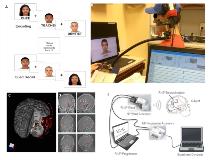Hippocampal Gamma Supports Associative Memory Performance as Measured by Acute and Chronic Intracranial EEG
Abstract number :
1.379
Submission category :
11. Behavior/Neuropsychology/Language / 11A. Adult
Year :
2018
Submission ID :
500681
Source :
www.aesnet.org
Presentation date :
12/1/2018 6:00:00 PM
Published date :
Nov 5, 2018, 18:00 PM
Authors :
Anli A. Liu, NYU Langone School of Medicine; Simon Henin, NYU Langone School of Medicine; Anita Shankar, NYU Langone School of Medicine; Nicolas Hasulak, Neuropace, Inc; Daniel Friedman, NYU Langone School of Medicine; Patricia Dugan, NYU Langone School o
Rationale: Previous investigations of episodic memory have described increases in hippocampal high gamma activity (60-100 Hz) during paired associates learning, measured in epilepsy patients undergoing invasive electrocorticography (iEEG) for surgical evaluation. We aimed to replicate and extend these findings using a novel paired associates task in a chronic ambulatory iEEG (RNS® System, NeuroPace, Inc.) population. Methods: A face-profession associative learning paradigm was utilized in 5 epilepsy patients implanted for surgical evaluation using traditional iEEG, as well as in 3 patients with chronic ambulatory iEEG. For chronic iEEG patients, the RNS System was adapted in a research setting to measure hippocampal dynamics time-locked to an associative memory cued recall task. Hippocampal iEEG data were compared for trials which were later remembered versus forgotten. Results: Increased hippocampal gamma (60-100 Hz) was sustained 1.3-1.5 seconds after stimulus presentation in successful versus failed encoding trials in traditional iEEG (surgical evaluation) patients (p<0.01 cluster corrected permutation test, with 189 successful and 168 failed trials). The hippocampal physiology in the chronic ambulatory iEEG (RNS System) patients was similar, with a sustained increase in high gamma activity 1.4-1.6 seconds after stimulus onset distinguishing successful versus failed encoding trials (p<0.01, cluster corrected permutation test, 261 successful, 267 failed trials). Conclusions: Our findings replicate other studies which demonstrate that sustained hippocampal gamma activity supports paired associative learning. Furthermore, the RNS System may be adapted for task-based cognitive research to make sensitive measurements of hippocampal dynamics in the chronic ambulatory setting. Funding: Doris Duke Fund to Retain Clinical Scientists (2016-2018)

.tmb-.jpg?Culture=en&sfvrsn=2a548407_0)